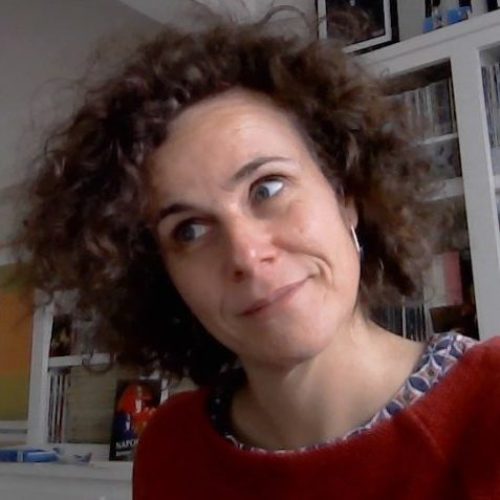Maï, in the ATAA forum, you recently told us about a job one of your clients offered to you. Can you tell us more about it?
A large postproduction studio in Paris contacted me in December 2022 about subtitling all the episodes of a very prestigious, very successful mini-series with a very comfortable turnaround time (4 months to do 7 45-minute episodes). They told me the rate would be 16 € per minute (for both adaptation and timespotting).
They also told me there would be a lot of extra work I’d have to do, like filling in tables, preparing a list of on-screen texts and a localisation list which is a list of recurring and/or important words specific to the series the client wants so they can check everything and ensure a uniform translation for both the dubbing scripts and the subtitles. Preparing these documents requires a lot of additional time and coordination with the dubbing and subtitling teams. For this extra work they ask us to do, which has increased significantly over the past few years, we don’t receive any compensation. But author groups are currently in discussions to get this work included in the list of paid tasks. The project manager seemed apologetic about the amount of extra work to be done and said that she could possibly pay me for the simulation [the step where the subtitles are proofread and checked with the programme] as a way to compensate me for the extra work.
At first, I was excited to work on this project and with the dubbing team. I knew one of the authors, and I liked the subject of the series. So, my desire to be part of the project led me initially to accept the job in principle. But after thinking about if for a few days, I did the math. When a programme has a lot of dialogue, which is often the case with a series, there’ll usually be about 18 subtitles per minute on average. At the rate they were offering, that worked out to 88 cents per subtitle. I’m lucky enough to have the opportunity to work regularly on projects that pay between 3.50 € and 4.30 € per subtitle. So I called the project manager back and refused the job because the rate was inappropriate. I explained to her that, being a staunch defender of proper rates for the profession, I could not, in good conscious, agree to such a low rate.
It was the first time that I was getting contacted to subtitle a programme that would run on Amazon. Along with that, I was also offered a dubbing project at a relatively acceptable rate of 28.60 € per minute, and I accepted that one.
Is this type of offer new to you?Yes, it’s quite new. I recently began getting offers for the platforms with rates that were usually quite good. This Amazon project was the first one I was offered with such a low rate. I hope my refusal will help the author groups, which are currently fighting for our rates, to obtain a much-needed increase.
Certain authors would be pleased with this rate of 16 € per minute. What do you think of that?
It was the first time anyone was offering me such a low rate. Certain platforms base their rates on the programme’s prestige. Amazon doesn’t seem to have taken that route.
Be that as it may, regardless of a programme’s prestige, that rate does not at all align with the qualifications and experience required to do this work. You also have to deduct your expenses, the cost of your equipment, etc. That forces you to work more in order for a project to be profitable, which I think is incompatible with quality, and a normal family or social life. You become a slave to your work.
Why then do some authors agree to work at that rate?
In our line of work, passion and enthusiasm are the main drivers. They incite a lot of translators to accept these conditions, especially early in one’s career, with the naïve hope that better things await around the corner. I perfectly understand that they have the impression that they have no choice. I also know that it’s easy for me to refuse unacceptable rates because I’m lucky to be able to work on prestigious projects, usually for the cinema. But I feel it’s in the interest of any and all translators to adopt this approach, to stand firm and not short-change yourself.
A study conducted by Audiovisual Translators of Europe (AVTE), which will be published soon, shows that the best-paid authors are the ones who negotiate their rates, irregardless of their experience or training.
Yes, because in reality, refusing bad rates gives you more time to work, which is essential, especially when you’re just starting your career. You’re building an image, a reputation, a better, more qualitative professional profile, which, I believe, in the long run will attract better projects, better rates and better working conditions. Once you’re recognised as a quality translator, who works for proper rates, you’re more likely to be offered better projects and better rates. It’s a virtuous circle. However, when you accept rates that are too low, you’re quickly labelled and given the worst-paid projects. You have to work more, one project after the other, possibly even sacrificing quality, and you’re left with no opportunity to look for new clients. You get locked into a vicious circle with no chance to have the time or energy to break out of it. That’s why it’s very important to set a base rate and stick to it, especially early in your career. For me, it’s about professionalism and solidarity with the community of audiovisual translators. And it’s also about self-respect. When you respect yourself, you inspire others to respect you.
Should we support the idea of an official, minimum base rate for the work we do? Would we run the risk of having all rates align with this minimum, to the detriment of the best-paid authors?
A few years ago, when the platforms arrived on the scene, our clients got a new category of projects to work with. For us, the work is the same. However, the market forced us to define a rate based on where the programme would be shown, with television and platforms on one side and theatrical (cinema) on the other. Today, we see that the theatrical rates are still in a separate class. They have not been constantly reduced like the ones for other types of distribution. I don’t think that imposing a minimum rate would drive the rates down overall.
I’m not personally affected by the drop in rates, but there’s only a handful of us in my situation. I think it’s all the more important to take a stand and make it known. I want to defend our entire profession, authors of all ages as well as experienced authors and beginners just starting out. Maybe my position will enable us to strengthen the message we’re all trying to get out.
Let’s go back to the rate of 16 €. For a 45-minute programme, that amounts to 720 €. Using the rate that you and industry professionals recommend, the subtitling would have cost about 2835 €. The difference between a good and bad rate is, in this case, 2115 € per episode, which seems insignificant given the production and distribution budgets these programmes have. How do you explain this?
I don’t understand it. It blows me away, it doesn’t make sense. How can there be such a huge gap between the astronomical budgets for these projects and the measly and insulting rates they offer us? For the person adapting the programme, the difference is quite significant. But considering the global production costs for these programmes, that’s peanuts. And they’re degrading the industry and the quality of the programmes because of it. And on a daily basis, authors end up having to fight for a few extra hundred euros, or even just a few extra euros.
I know there is a phenomenal number of projects out there, and our end clients are certainly very concerned about the financial aspect. But looking at each individual production, it’s a drop in the bucket. I don’t have a crystal ball to see what’s really happening behind the scenes as regards the production and distribution process, but it seems crazy to me. How is it that I can be paid nearly 10 times more than other authors for the same work and for the same end client? Including the hit shows that cost millions to produce. Where is the money going? The work is always the same for us. Who decides that a project will get a cheap translation abroad while another will be translated in France? Why are some projects entitled to a professional translation and others are not? Who makes those decisions? Without us, these programmes would never be able to be distributed around the world. We’re an essential cog in the distribution wheel for these programmes.
Why is the subtitling or the dubbing of a programme essential for its distribution?
The original language version of the programme stands on its own when you understand the language. Our work is to make it accessible, as discreetly as possible, to viewers who don’t understand the language while remaining faithful to the original work. I would say our goal is to try to make it shine. When I choose a word, it’s to carry a message, to transmit it as strongly and as best as possible. Our adaptation has the possibility to give it incredible strength. There are lines from dubbed programmes that still resonate with new generations that can become cultural references.
In Imaginary Homelands, Salman Rushdie writes: "It is normally supposed that something always gets lost in translation; I cling, obstinately, to the notion that something can also be gained."
Absolutely. Certain adaptations have become classics. Only a professional adaptation can attain those heights of quality. A bad amateur translates words. A good professional translates ideas and emotions. And in the case of audiovisual adaptation, the register is even broader because we have to take into account what’s on the screen, the sound, the editing style and the shots.
We could say that good subtitling or dubbing adaptation allows the viewer to have an infinitely more complete experience and let’s them discover a work that, without us, would be inaccessible. When the work is done well, viewers don’t even realise an adapter crossed their path. However, when the opposite it true, a bad, unprofessional adaptation can make a programme completely unwatchable.
According to a study conducted by the Entertainment Globalization Association (EGA) based on 15,000 consumers of streaming platforms, 65% said they stopped watching a programme because of its adaptation at least once in the year. And 30% are forced to stop watching something each month. Some say the drop in quality is due to a lack of adapters, or rather good adapters.
In reality, a lot of subtitling work is sent abroad because it’s a lot cheaper! There are enough competent, quality authors in France to handle the demand, and many of them are looking for work, but they can’t work for just any rate. Some of our clients are clearly less interested in quality. For questionable budgetary reasons, simulations and verifications, which are the phases where an adaptation is reread and checked, are no longer carried out. Others involved in the postproduction process, such as artistic directors are not pleased about this either.
Unfortunately, in the realm of audiovisual adaptation, I’m afraid subtitling gets the short shrift. Even though Netflix’s approach failed, the fact that they used amateurs for a few months to subtitle their programmes is a good illustration of that. It reinforced the idea that subtitling was easy and that anyone could do as a hobby. We now see that that false and misleading idea stuck. Furthermore, the quality of the subtitles for Netflix is regularly flagged in the media and on social networks.
Where does this lack of interest in quality with distributors come from?
One possible explanation for this reduction in stringency is that the “localisation” managers, (a term I hate actually) are getting younger. They have a business background. They no longer really have any artistic of cinematographic sense. They sell "products". This trend started about 20 years ago when the number of cable channels was going up exponentially and the amount of work started increasing. As a result, subtitles are nothing more than an element in a sales and content distribution agreement.
Certain projects are processed using artificial intelligence, and the results are more or less checked by human operators who don’t even always see the programme. We’ve all noted the horrendous results that such a process yields. As I see it, what’s called "artificial intelligence" is both one of the biggest threats and one of the biggest failures out there to come along for the work we do. An artificial intelligence will always be artificial. It will never be able to communicate nuances and emotions, which give the programmes we adapt their humanity. When we adapt a programme, we spend time thinking about each word we choose, each comma, so that we do the programme justice. A machine can’t do that. I’m convinced that we, humans, will continue to be the masters of translating irony, sarcasm, double-entendre, and formal and informal registers ("tu" or "vous"), for example.
This excitement over all-things-automatic has already had an impact on how we work and on the tools that certain clients force us to use. The word "productivity" is quickly replacing the word "quality", and I think that’s very sad.
How do we break out of this vicious circle?
I think the collective bargaining actions are yielding encouraging results. They’re heading in the right direction for dubbing projects [an increase in the dubbing rate has moved it closer to the industry-recommended rate of 33 € ]. As for subtitling, for the moment, the results have been much less conclusive. We need to get heard. We’ve said it before, viewers are conscious of quality and it’s important to them. After all, the work we do is for their benefit. They are the ultimate end customer. Let’s complain to the platforms when unacceptable working conditions are imposed on us by the intermediaries. Let’s negotiate our rates, let’s tell the public about the real origin of the problems they’ve noticed, namely the working conditions we have to deal with. There’s a lot of great energy out there. Every day, I see talented young adapters, who are passionate about what they do and who are committed to “saving” our trade. The amazing author groups blazed the trail. They’ve proven that great results can be achieved by joining forces. So let’s keep the momentum going! Let’s stick together. Let’s ride the wave. Let’s stand united and make some noise to defend our livelihood!
English translation: Débora Blake



